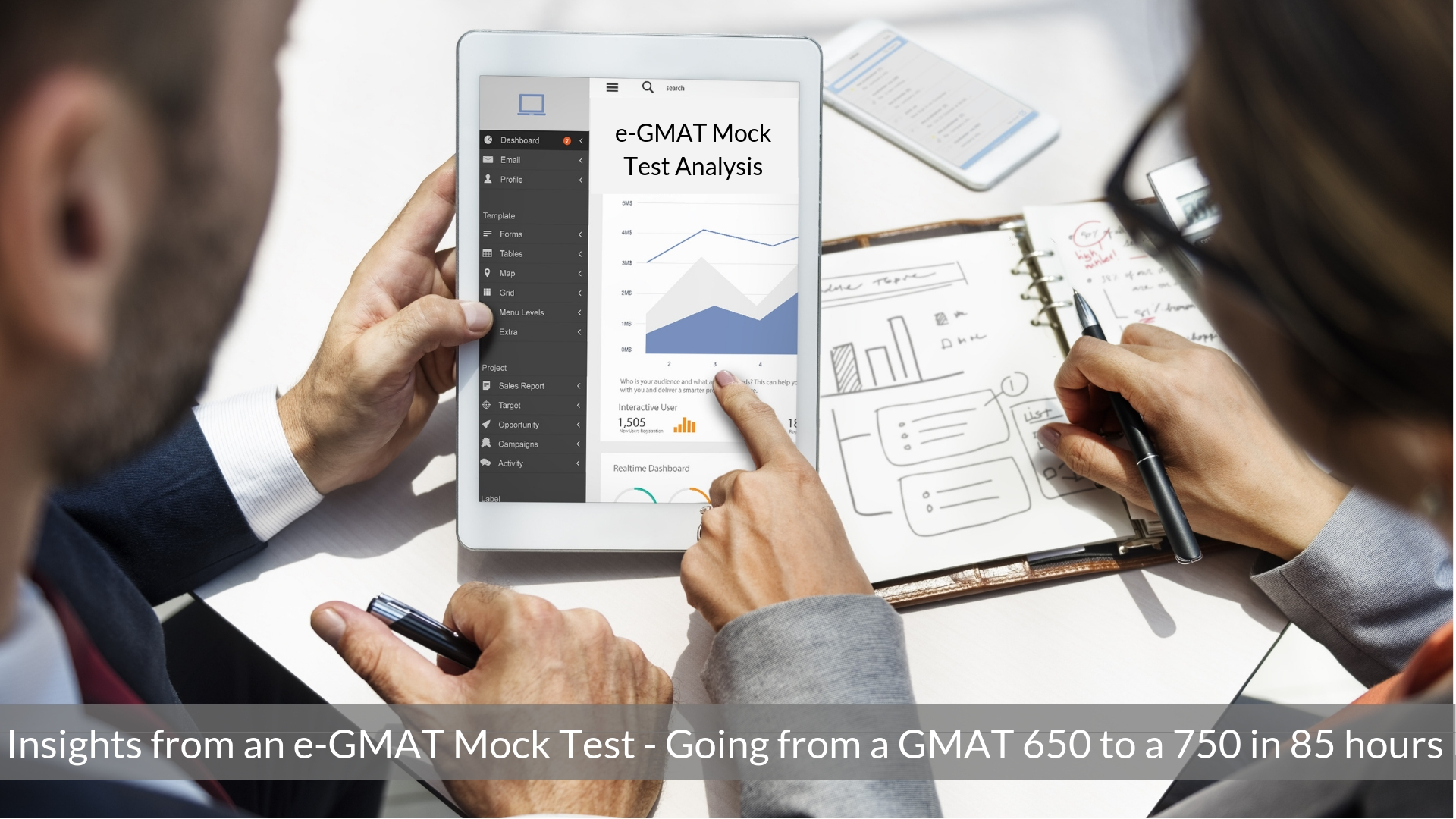1.1 Executive Summary of e-GMAT Mock Test Experience
Amogh is at a 650 in his recently taken GMAT Mock Test and aims for a 750. The key questions in his path to achieve the target are:
- What are the areas where he can improve?
- How to achieve the improvement
- How much time is required?
The e-GMAT mock test that he took gave an answer to each of his questions.
His score split is:
| Total – 650 | Quant – 50 | Verbal – 29 | |||
| Art. | Alg.-Geo | SC | CR | RC | |
| 65% | 94% | 50% | 49% | 60% | |
- The analysis started with his sectional scores. Between Quant and Verbal, Verbal is the area that he needs to focus on the most.
- In Quant, he is already good at Algebra-Geometry problems and needs to work on Arithmetic problems to get the desired Q51.
- In Arithmetic, he can solve medium and medium-hard questions well but, falters on harder ones. So, he will now focus on solving hard problems in Arithmetic from Scholaranium.
- On analyzing the attempts, he found that he has gaps in specific concepts only. So, he need not go through the entire Arithmetic course; rather use Scholaranium to identify the topics in each of Number Properties, Word Problems, etc. that are holding back his score. Precision in solving is the key here.
- Such a focused approach will reduce his preparation time from 50 hours to just 10 hours.
- In Verbal, he has a balanced ability in all 3 sub-sections
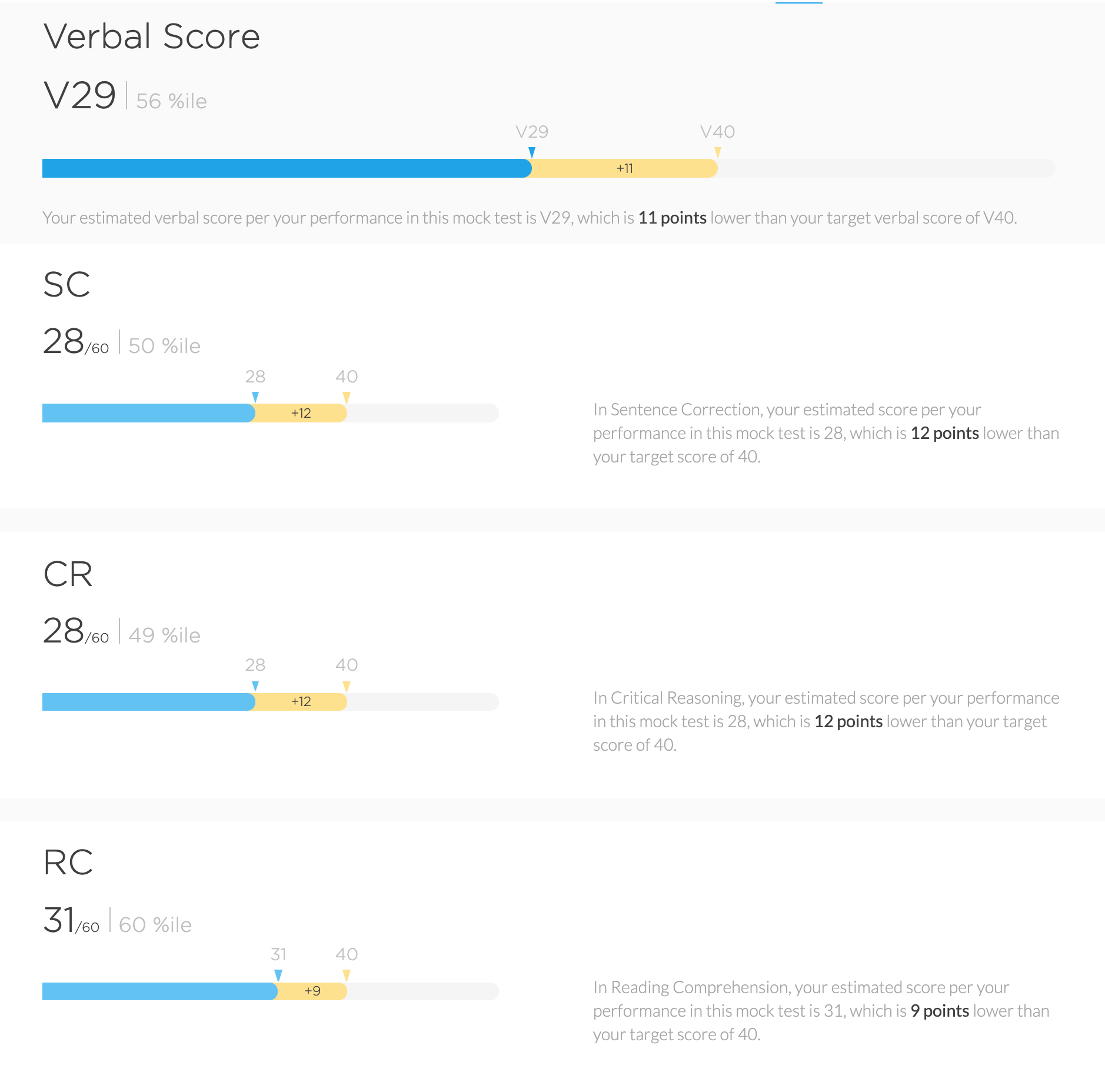
- In SC (Ability = 50 Percentile), Amogh spent enough time per question on every question. Hence, the reason for his low percentile score is his ability. To improve, he will need to go through the e-GMAT SC course diligently and leverage the Scholaranium platform to fine-tune his preparation later. This will take around 30 hours of prep time.
- In CR, he faltered when M-H questions came up. He also has some idea of the question types he is more confident of. So, to reconfirm his assessment about the topics and question types he needs to take a CR ability quiz in Scholaranium and use this knowledge to focus appropriately on the pertinent sections of the course. He can complete the CR prep in around 30 hours.
- In RC, the time taken to solve questions is commendable and it shows that he has good reading skills. With only one RC wrong, he needs to work on the specific question types that he falters on. To identify these types, he will take an RC ability quiz in Scholaranium and improve upon the same. The prep time for RC will be only around 15 hours.
- The progression screen shows that he has good test-taking skills, distributing his time efficiently amongst different questions. Neither, he needed any time to settle in nor did he face any time crunch towards the end. This is because he balanced out the time spent on correct and incorrect questions, doing justice to the questions he had the ability to solve.
- Summing up – by investing 85 diligent hours Amogh can improve from 650 to 750.
Video Interview of Amogh’s e-GMAT Mock Test Experience
Key highlights of Amogh’s Experience:
- From 4’20” to 19’48” we discuss Quant performance, how to isolate the weaknesses and then work upon them
- From 19’49” to 24’01” we discuss Verbal overall
- From 24’02’’ and 26’12’’ in the video, we discuss about SC
- From 26’13’’ and 29’11’’ in the video we discuss about CR
- From 29’12’’ and 31’07’’ in the video we discuss about RC
1.2 Quant
1.2.1 Scores
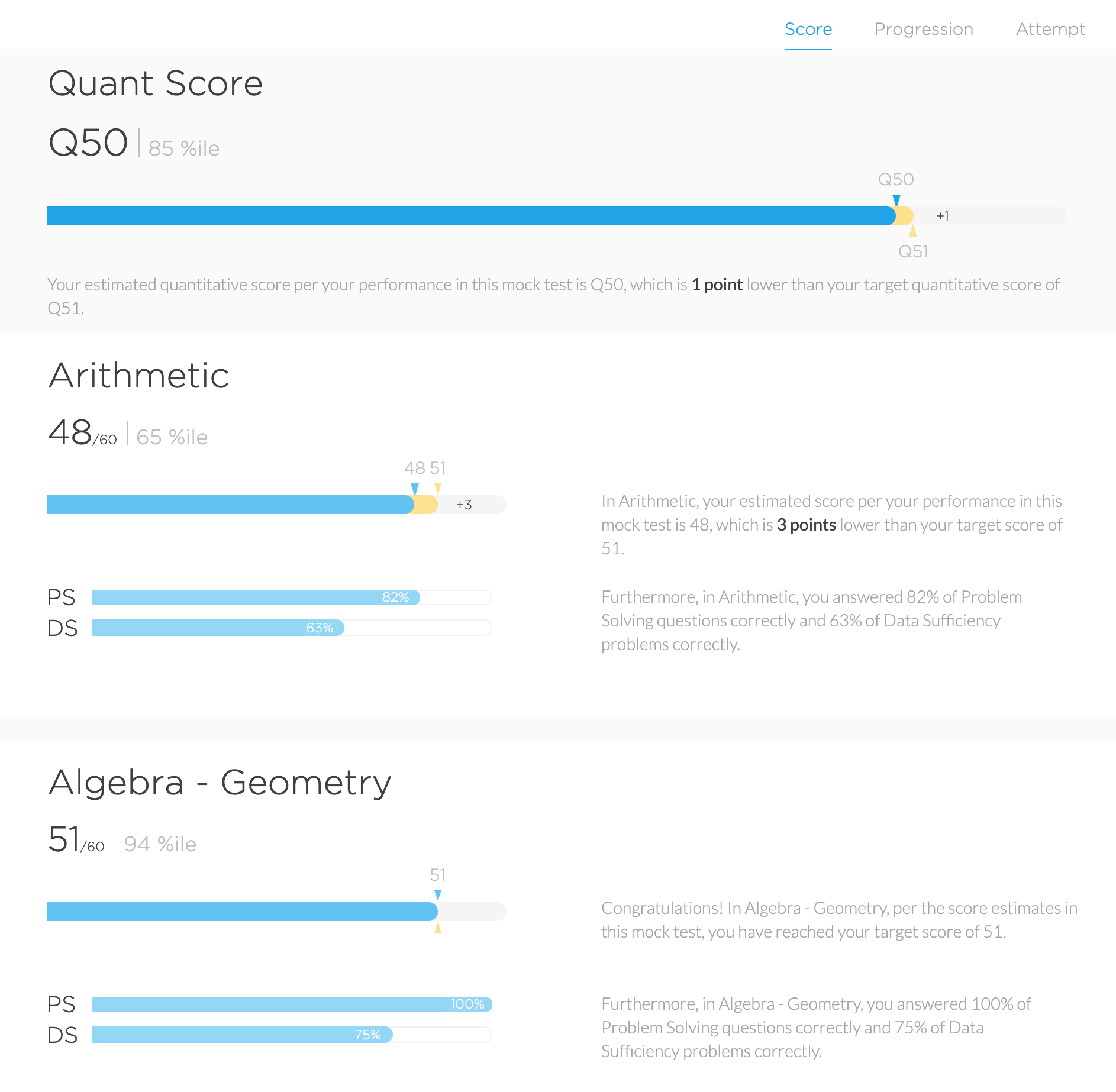
His Quant score is Q50 with a split of 48 in Arithmetic and 51(maximum possible score) in Algebra Geometry. His target score is Q51. It is very evident from the scores that this point improvement must come from Arithmetic. So, let’s do a deeper dive in Arithmetic performance.
1.2.2 Progression
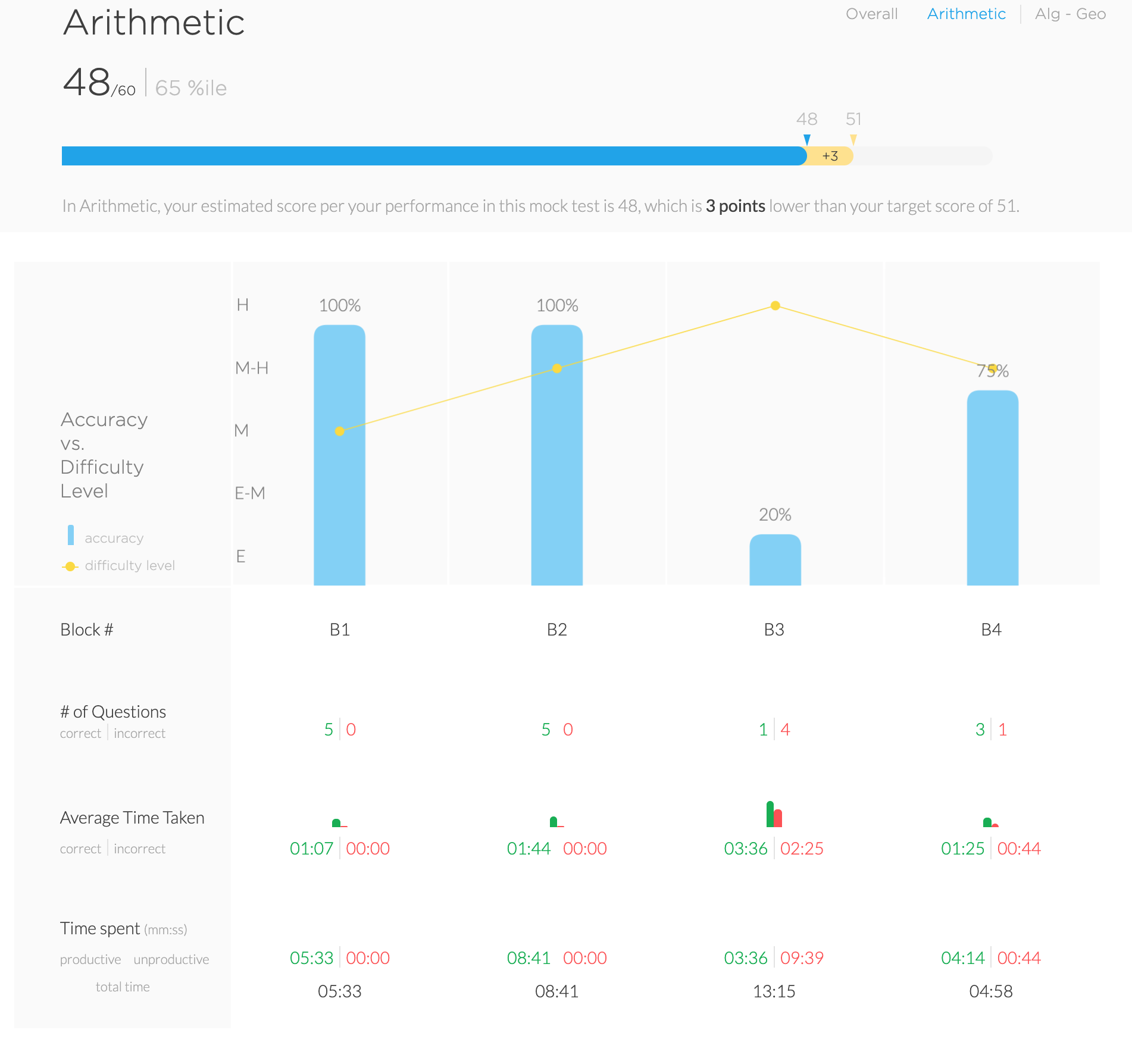
We would first look at how Amogh progressed through the test in Arithmetic. Here is the Arithmetic Progression analysis screen from his Mock Report.
You see that he has 100% accuracy in Medium and Medium-Hard questions. The difficulty level of questions increases further as this is an adaptive test. But as soon as he encounters Hard questions, his accuracy drops indicating that he has the ability to solve questions up to Medium-Hard difficulty level. He now needs to work on his ability to solve Hard questions in Arithmetic.
1.2.3 Topic Level Understanding
Now that we have identified it is the hard questions in which he faces difficulty, let’s find out if these questions belong to a particular topic or are they spread across the board. We will look at the Attempts screen to get this information.
In this screen, we can see that the student faltered in Number Properties and Word Problems. At the sub-topic level, there is no one topic where he faltered more than the others.
What we can also see is the amount of time he spent on the questions he got incorrect.
- The questions in which he spent less than optimal time, we can see the feedback that he may have got the question because he rushed through it which is also what he mentioned about that one question. He faltered there because he did not follow the process as taught in the course.
- The questions in which he spent optimal time, he faltered because he has conceptual and/or process gaps. He must review the solutions to these questions to identify why he made these mistakes and then work on that aspect.
- The questions in which he spent more than the optimum time, it was probably because it was from his weak topics and no matter how much time he spends on this he is more likely to get it incorrect. In such cases, it is better if he skips such questions just when he realizes he is not getting anywhere with it in the first minute-minute and a half.
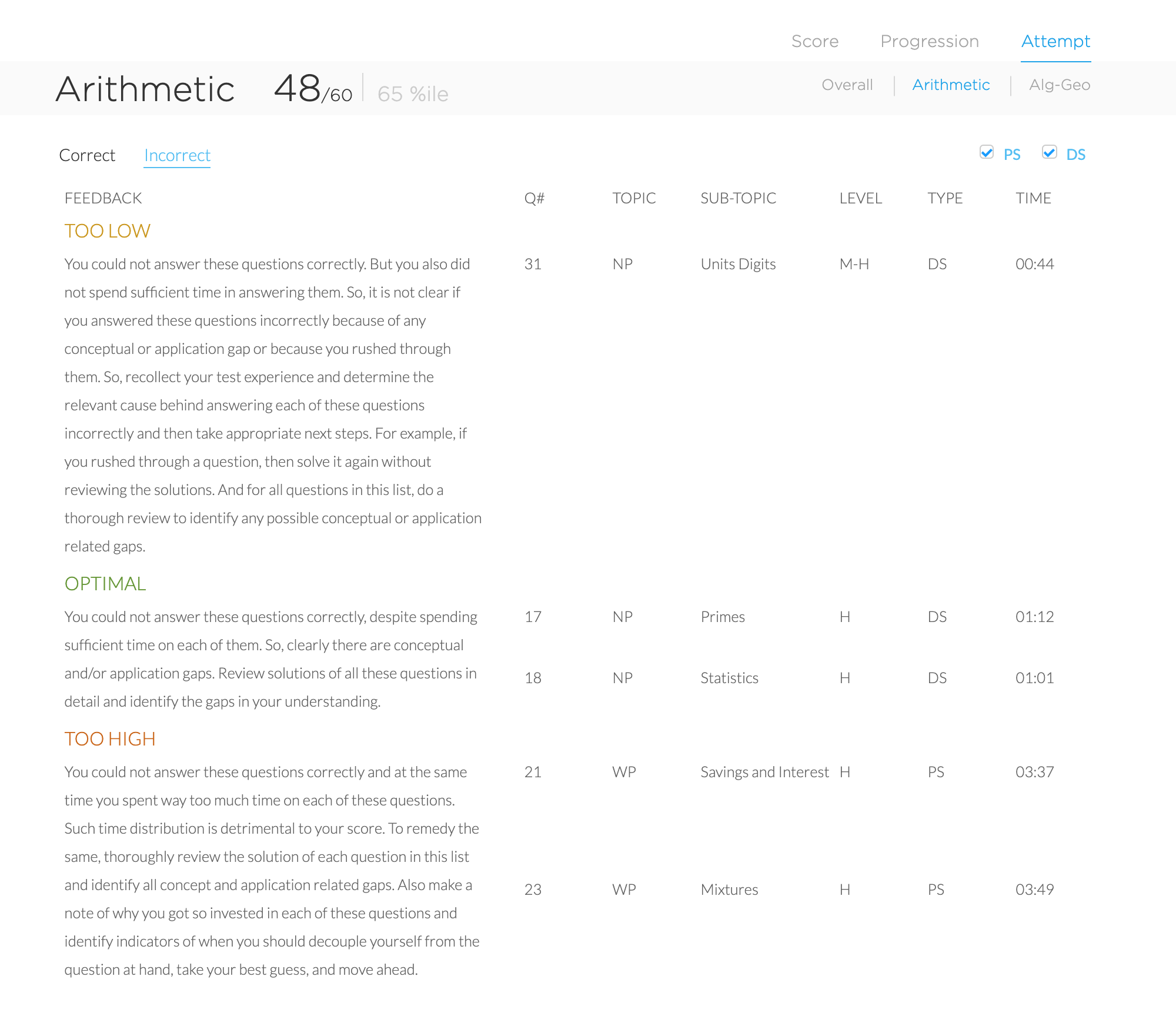
1.2.4 What Next?
Since he is already at a decent ability in Arithmetic and is only faltering in Hard questions, he need not go through the entire course again. He must make use of Scholaranium to work on Hard questions. In the review process, if he realizes that he has certain process gaps, he can go through relevant Application Files.
In addition to Arithmetic, he made one mistake in Algebra/Geometry, and he must review it too to make sure he does not repeat the same mistake.
Normally, improving from a score of Q50 – Q51 would take approximately 50 hours, but with such a precise understanding of the gaps, it would take Amogh 7 hours of dedicated study to improve.
1.3 SC/CR
1.3.1 Progression
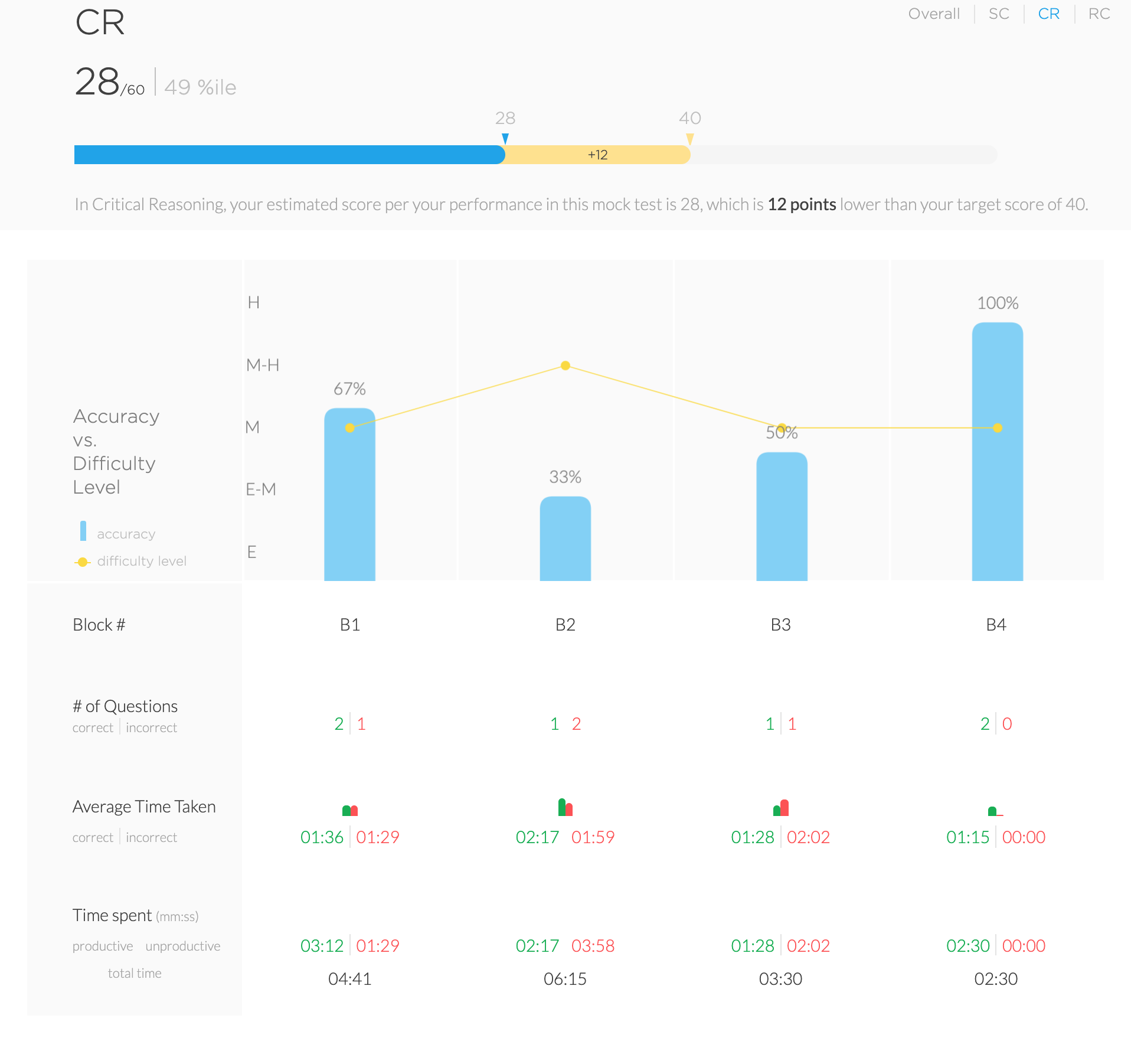
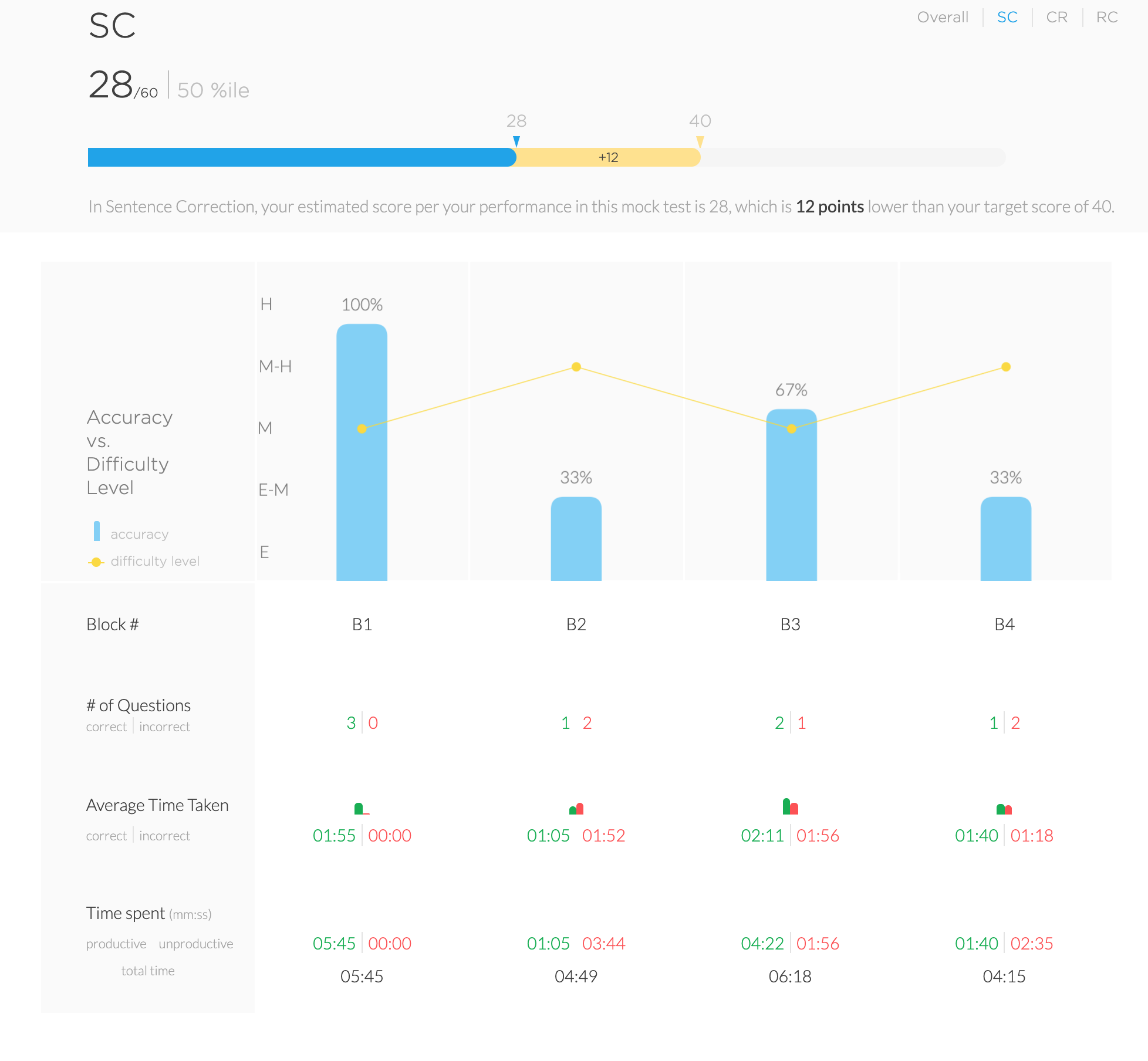
In the SC analysis screen, we notice that he has spent enough time on all the questions. This means that the issue is with his Ability in SC and he needs to work on bridging the gaps. From the progression screen, it is evident that he can solve medium questions well, but as soon as the difficulty level moves to Medium-Hard questions, his accuracy drops significantly. The performance on Medium level questions is also not consistent indicating gaps at conceptual and process understanding and application.
If you notice, it is the same case in CR. He can handle Medium level questions fairly well, but as soon as it comes to Medium-Hard questions, the accuracy drops. The performance on Medium level questions is also not consistent indicating conceptual and process gaps.
1.3.2 Attempts
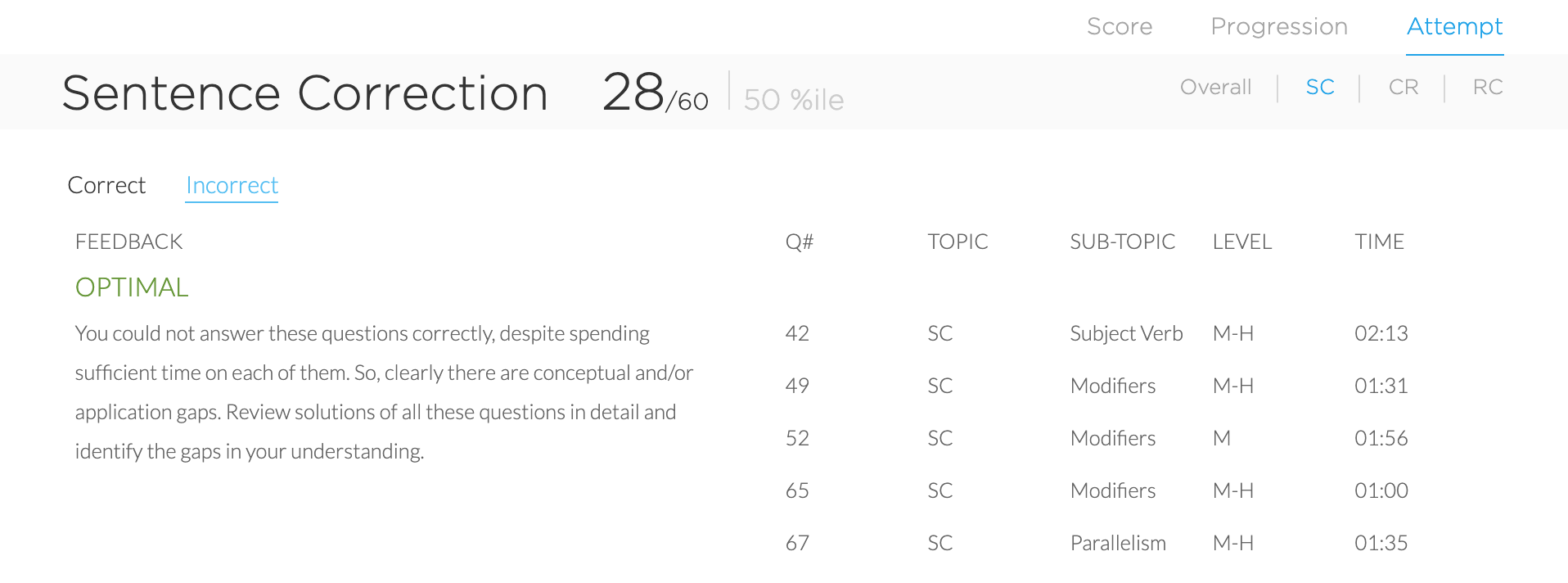
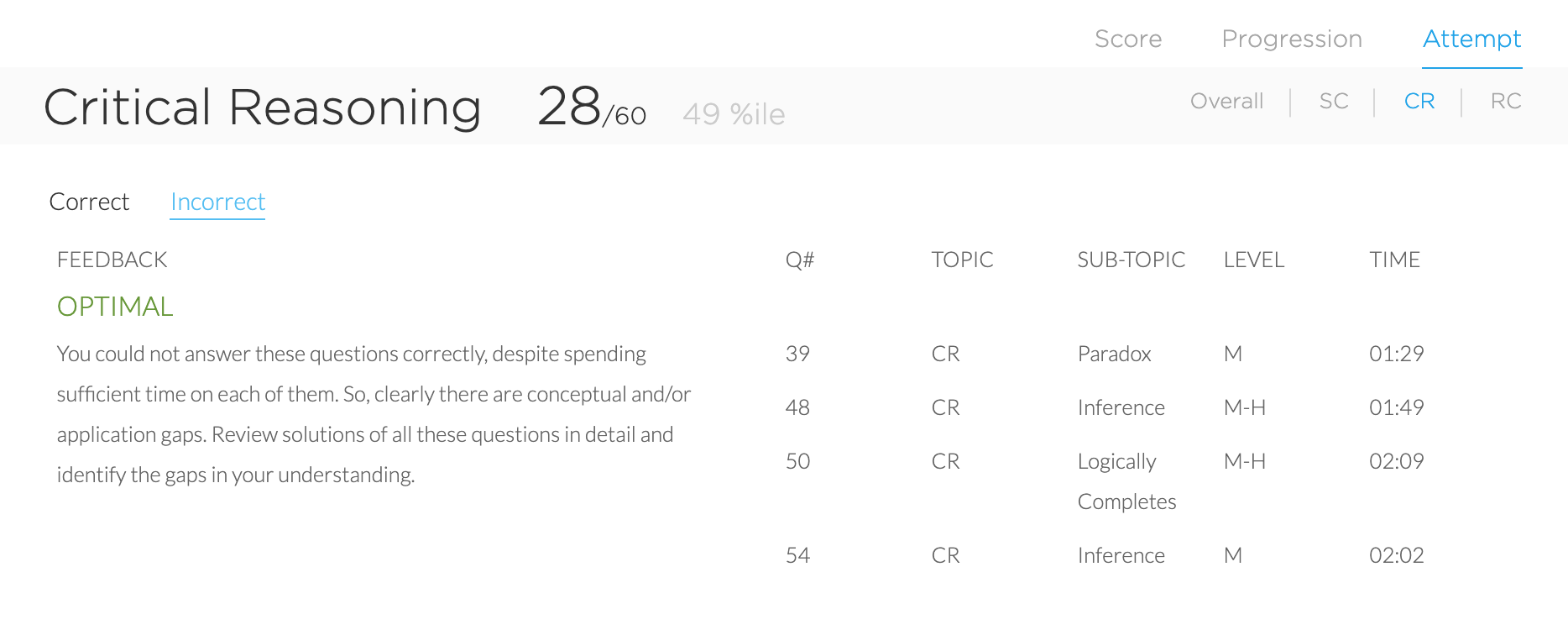
When we check the Attempts screen for SC, we see that he has made maximum mistakes in Modifiers, and then one mistake each in Subject-Verb and Parallelism. In CR, his mistakes are across different topics.
1.3.3 What Next?
Since our analysis so far suggests that he has both conceptual and application (process) gaps in SC and CR, he should go through these courses. While doing so, he must pay special attention to the topics he has identified as weaknesses in this test such as Modifiers, Subject-Verb, Parallelism, Inference, etc.
He would be required to spend approximately 30 hours for each SC and CR to reach his goal.
1.4 RC
Amogh’s performance in RC brings to fore a very interesting aspect, and that led us to discuss it separately. His overall score in RC is close to his scores in SC and CR; however, on further analysis of the progression and attempts, we realized that he is a good reader. Let’s look at the factors that led to this conclusion.
He can solve a Medium level passage very well and has 100% accuracy in it. His performance in Medium-Hard passages was inconsistent, i.e. he got all the questions from one passage incorrect whereas he got most of the questions from the next passage correct. We then looked at his Attempts Screen and here is what we found:
| Time Taken | |
| Passage 1 | 5.40 |
| Q1 | 2.27 |
| Q2 | 0.20 |
| Q3 | 0.29 |
| Q4 | 2.24 |
| Passage 2 | 6.37 |
| Q1 | 2.43 |
| Q2 | 1.48 |
| Q3 | 0.55 |
| Q4 | 1.11 |
| Passage 3 | 3.04 |
| Q1 | 2.17 |
| Q2 | 0.33 |
| Q3 | 0.14 |
| Passage 4 | 5.36 |
| Q1 | 2.25 |
| Q2 | 3.00 |
| Q3 | 0.11 |
Reference time for an RC passage with 3/4 questions is 6/8 minutes. As you can see, Amogh could solve all the passages well within the time and other than 1 passage that he got incorrect, he got everything else correct. This indicates that he is very good at comprehension and now only needs to work on fine-tuning his skills.
1.4.1 What next?
He should start with Scholaranium to practice more passages. After solving every passage/quiz, he must review the solutions thoroughly to understand the kind of mistakes he makes and work on those aspects.
He would need approximately 10 hours to improve in RC.
1.5 Test Taking Strategy
An effective test-taking strategy is crucial to get a good score. GMAT being an adaptive test, the most important test-taking strategy is to know how much time to spend on which question and which question to skip. Amogh seems to be doing that well. Across the different sections, he has not spent an inordinate amount of time in any question. He did not require any time to warm-up in the beginning, and we see no effect of fatigue towards the end of the test.
Looking to improve your GMAT score to become a more competitive applicant? We can help you by giving you access to quality online content to prepare. We are the most reviewed GMAT prep company on gmatclub with more than 1825 reviews (as on May 13, 2019). Why don’t you take a free trial and judge it for yourself?
Write to us at acethegmat@e-gmat.com in case of any GMAT or MBA admissions related queries


